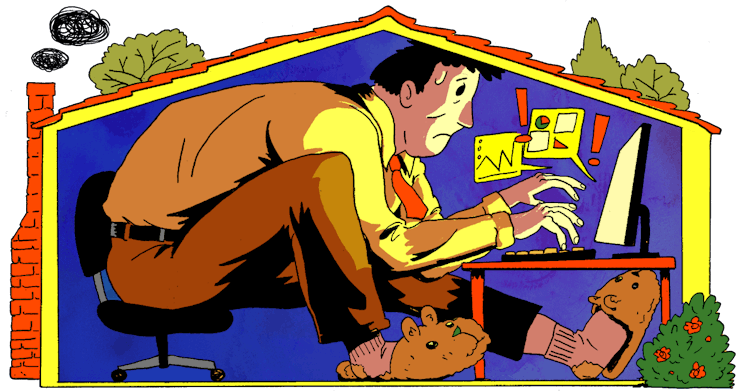What to Do If You Absolutely Hate Working From Home
It’s not about doing any one specific thing. But it might help to bring back elements that once made you happy and find ways to go off script once in a while.

You have a desk and a door. Sometimes it gets respected when it’s closed, so even though you’ve been working from home, you’ve managed to get your work done. And you hate it.
You hate it.
On second thought: Yeah, you still hate it.
Of course, you recognize the upsides, particularly more time with your kids, but the novelty is long gone and what was once acute has become chronic, says Robyn Landow, New York City psychologist. There’s no movement or separating work from home. Work itself has become jumping from meeting to meeting with just a click. And it’s going into its 19th month.
“It feels like one long, interminable slog,” says Art Markman, vice provost and professor of psychology at University of Texas and author of Bring Your Brain to Work.
You’ve come to realize that annoyances like commuting and having to wear shoes actually served a purpose. They defined your time and announced that you were going to a special place where no one touched your stuff. There was no dog barking in the background, and when you were interrupted, it was by another adult.
The commute itself allowed you to let go of the day and think at your own pace before you got home. “You get to be in your own head,” notes Robin Norris, marriage and family therapist in Virginia.
But you haven’t been able to do that. What’s more, it doesn’t look like big re-openings are going to be happening any time soon as predicted. That feeling of being stuck has grown stronger.
So your challenge is to get unstuck. It’s not about doing any one specific thing, but it might help to bring back elements that once made you happy and find ways to go off script once in a while.
The following might help.
Use the Season to Reassess
January might start the calendar year, but when you have young kids, September is the real beginning. With everyone trying to re-establish schedules, it’s the opportunity to look at what’s been working, what hasn’t been, and make tweaks. One thing you want to ask is what do you miss about your pre-COVID life? That in itself won’t suddenly improve the situation, but when you identify the issues, conversations with your partner shift from pure complaining into problem-solving.
Go Outside More
How often do you head outdoors? The answer should be at least once a day. Yes, it’s fresh air, standing up, and getting sunlight. But it’s also a break. (Taking an actual lunch would suffice as well, hint, hint.) The benefit is in the name. A break stops things and sets up a boundary, especially good amid constant Zoom meetings. “We’re not built to watch ourselves all the time,” Landow says.
The other thing that happens when you take a walk or go the hardware store is that you could run into someone and end up talking about, well, whatever. The prospect of what might happen is the whole point. “It gets you out of a mode when you feel you’re marching all the time to a different beat,” Markman says. “You get off the schedule.”
Schedule Your Personal Time
One component that’s been lost is the stuff, like mid-morning coffee with a few coworkers, which started organically, became a regular thing and ended up framing your day. It might feel forced to schedule, but you want to do it. Even if for just 10 minutes, those “non-productive calls,” are anything but, Norris says. When working from home, it’s easy to put your head down and plow through. The problem? “You’re not turning your brain off,” she says. A little water cooler talk does that, especially for those that hate working from home but the other plus is that you reconnect, because while you might be part of a team, it’s hard to feel that when you don’t actually get the see the team.
Seek Out Fun At Home
It sometimes gets deemed a luxury item, but a few minutes of play helps calm down your system and lets you do a full-body unclench. With the kids, it could be throwing blocks onto the floor and joining in or turning on your exercise app and having them do the program. “Anything wacky will be novel to them,” Markman says. “They’re not jaded yet.”
With your partner, the challenge is that you used to bring news home, but now when something happens, Markman says that the reaction is, “I know. I was there.” It might help to read to each other, or read/listen to the same thing and discuss what you felt. “Part of what you need is external information that will add something to the conversation,” he says.
Fine Tune the Knobs
In the review of how things have been going, you might see a string of hobbies and projects that were started but soon dropped. Part of that might have been that it was too much too soon, whether it was baking bread, writing or reading. It goes for Zoom calls as well. None of those are inherently bad. They just don’t need to be binged, Landow says.
You can return to the things that still interest you, now in a course-corrected, reasonable amount. It all falls into the need for self-care, something that gets mentioned so much that it becomes meaningless. That stuff does work, but only when you figure out what’s helpful for you.
“Everyone can give their list,” Landow says. “But it’s different for different people. It contributed to a healthy life for you previously so you need to figure out how to get it back or approximate it.”